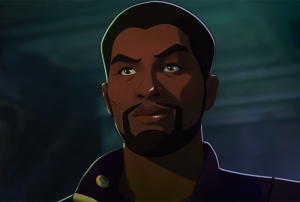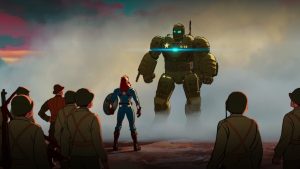SPOILERS FOR WHAT IF…? AHEAD!
Come August 28th, it will have been a year since we mourned the sudden and shocking loss of Chadwick Boseman, the man behind the instantly-iconic character of Black Panther – and for many of us, the pain of that parting still feels raw and vulnerable. Boseman was so much more than an actor in some of our favorite movies: he made the most of every moment he had on this planet to inspire people around the world through his work and especially through Black Panther, and his full impact – particularly on the Black community – can’t be put into words by me.

But while today’s episode of What If…? obviously can’t fully accomplish that gargantuan task either in just thirty minutes, it does a beautiful job of bringing Boseman’s legacy of kindness to life onscreen, assisted by luscious animation and a brilliant performance from Boseman himself, who recorded all his lines for What If…? before his death. Focusing on the repercussions of a change to the Marvel timeline that turns his T’Challa into the character known as Star-Lord, this episode is just as much a microcosm of Boseman’s own impact on the real world as it is of T’Challa’s impact within the confines of the Marvel Multiverse – a glimpse into those areas where the actor and the character overlapped on some level.
And where the two overlap is where the magic happens, and Boseman slips into the character of T’Challa so effortlessly that it doesn’t matter if he’s wearing the mantle of a Star-Lord rather than the solemn duties of Wakanda’s king: it’s T’Challa, the man underneath all the trappings, that we love. And that’s why this episode is a perfect encapsulation of what can make What If…? so rewarding to fans, because these stand-alone stories are supposed to shine a spotlight on the characters themselves, removed of their iconic gear and cool nicknames, placed in a wholly different scenario, but still themselves at their core; still making the decisions we know that character would make.
That’s exactly what the first episode of What If…? got so terribly wrong, using Peggy Carter to tiredly hit all the same plot beats as Steve Rogers did in The First Avenger. That episode could have been about almost any character in the MCU being injected with the Super-Soldier Serum, and it really wouldn’t have mattered because the writing was entirely plot-driven, leaving no room for the bold character choices we need from a What If…? scenario. It ceased to be a story about how Peggy Carter wears the mantle of Captain Carter and what she brings to the job, and became a recap of Steve Rogers’ movie, starring interchangeable action figures whose individual personalities matter less than a shield.
That’s always been a criticism of MCU movies, and I hated that the studio – which is, in fact, moving away from that mentality overall – gave its own detractors ammunition like that. This episode of What If…?, on the other hand, takes the cornerstones that make up T’Challa’s character – such as his dignity, generosity, open-mindedness, and his desire to do good even when it requires him to upend the status quo – and uses those as the rock-solid basis for an original story that has similar vibes to Guardians Of The Galaxy, sure, but veers off in a completely different direction.
T’Challa being abducted from earth in place of Peter Quill (voiced by Brian T. Delaney) because the Ravagers were misled by Wakanda’s energy signature, him accidentally becoming the Star-Lord, and having a chance to share his kindness and pure spirit with the rest of the galaxy: that quite literally changes everything in the MCU – like, to the point where he doesn’t even form the Guardians Of The Galaxy in this timeline because he’s already averted most of the tragic events in each member’s backstories.
And the episode takes its time to reveal this, peeling back the layers so precisely that when the episode starts with T’Challa going about the exact same Power Stone heist that Peter Quill pulled off in the first Guardians Of The Galaxy movie, you might be wary that it’s a repeat of what happened with episode one. But the catch is that, while Peter Quill kicked off the events of Guardians Of The Galaxy by trying to sell the Power Stone on the black market, T’Challa plans to use it to solve an energy crisis in the Krylorian star-system.
We get to see the impacts of T’Challa’s actions everywhere he goes. For one thing, he and the Ravagers’ captain Yondu Udonta (Michael Rooker) are actually close – and while their father-son dynamic still comes with conflict, T’Challa’s maturity and wisdom helps him navigate those rough patches, and facilitates an earlier redemption for Yondu. In this timeline, Thanos (Josh Brolin) runs a bar and gardens in his spare time – having been convinced by T’Challa that his plan for randomized genocide on a universal scale as a means of resource reallocation isn’t efficient or ethical (although there’s something eerie to Thanos constantly repeating that his plan would have worked).
As for Thanos’ adopted children, we only meet this timeline’s version of Nebula (Karen Gillan) – who is still mostly humanoid, having never been hardened into a sentient killing machine for her father. Side-note: It’s very weird seeing Nebula with any hair, much less a full head of wavy platinum blonde locks like a 1940’s movie-star. She’s still not on good terms with Thanos, which I appreciate because she has legitimate reasons to be upset with him besides turning her into an android, but she’s also funny, fashionable, and even a bit flirty around T’Challa (whom she calls “Cha-Cha”), and Karen Gillan does a great job selling the whole performance.
Later it’s revealed that Drax (voiced by Fred Tatasciore, due to some kind of “miscommunication” behind the scenes) never experienced the crushing loss of his wife and daughter – which would have sent him down the dark path to vengeance – in this timeline. In a bizarre twist of fate, he’s now working at Thanos’ bar. Even Korath (Djimon Hounsou), a minor villain in Guardians Of The Galaxy, ends up joining the Ravagers team and abandoning the Kree zealot Ronan. And while some of these changes might seem over-the-top divorced from context, Boseman’s charisma makes it believable.

Now…that’s not to say everything in the universe is magically fixed by T’Challa’s presence. Thanos retires from his life of evil, but the power vacuum he leaves behind is quickly filled by another tyrant – Benicio Del Toro’s Collector. This twist makes a lot of sense, and retroactively helps to elevate this bizarre character as a legitimate threat, something he never got to be in the movies before getting killed off. In What If…?, with the help of the Black Order, the Collector has already done pretty well for himself – nabbing a whole bunch of new trinkets to add to his collection, including Mjolnir, Captain America’s shield, and – most horrifyingly, to me – Hela’s telekinetic helmet.
Along with the fancy weaponry comes an element of action that was completely missing from the character’s previous appearances, and perhaps feels a bit jarring here because of that. He’s still drowning under several pounds of snazzy bling when we meet him, but he quickly sheds his outer layers to reveal an impressive six-pack, and show off some martial arts moves. Del Toro seems to be having a great time voicing the character and doing weird stuff with his line-readings, which totally works for the Collector.
Oh, and can we just talk about Carina (Ophelia Lovibond) for a moment? One thing I love about the Multiverse is that even the most obscure characters can return and get payback for how the films did them dirty. And Carina, the Collector’s abused servant, has deserved a second chance ever since James Gunn used her to demonstrate the destructive abilities of the Power Stone in Guardians Of The Galaxy by having her get blown to smithereens. Just as Gunn has gotten better at writing women, so too has the MCU slowly improved.
In What If…?, Carina finally gets revenge on the Collector for all the evil things he did to her, smirking as she slips on the bracelet that allows her to control his minions and turn them against him. I love how there’s no attempt to moralize about her actions, and we don’t even get to see what happens – we just hear the Collector squealing the word “Karma!” before he’s buried under the weight of his own monstrous creations. It’s so dark, it’s so powerful, and I don’t think enough people are as obsessed with this scene as I am.
Contrast that scene with Peter Quill’s non-reaction to Carina’s death in Guardians Of The Galaxy, however, and you’ll notice that this whole episode is pretty damning for Quill – whose time as Star-Lord has resulted in a lot less peace and harmony, and a lot more apocalyptic catastrophe. His swagger, braggadocio, and self-absorbed attitude have always teetered between endearing and irritating (no thanks to Chris Pratt being the absolute worst), and his casual sexism in the Guardians franchise was never cute. It’s a real shame, because we absolutely deserve the messy, dramatic, canonically bisexual disaster that is Marvel Comics Quill, and we’re probably never gonna get it from Pratt.
And that’s why I’m so intrigued by the new version of Quill we met today in What If…?, who never got off-world – and is not voiced by Chris Pratt – but instead ended up working at a Dairy Queen in Missouri while T’Challa took his place among the stars. The episode concludes with Ego the Living Planet (Kurt Russell) donning human form and reuniting with Peter, juxtaposed with scenes of T’Challa returning to Wakanda and introducing his biological family to his found family from outer space. I really hope we reconnect with Quill and Ego at some point, because that’s too big a cliffhanger to leave like that.
Across the board, this is a massive improvement on the premiere episode. The writing is more sophisticated, the action is even cleaner, the voice-acting is stellar, and even Jeffrey Wright’s The Watcher – while still a background character – gets to engage with the material a bit more, just as I’d hoped he would. Most importantly, What If…? knows, or at least I hope it knows, that at its core it has to be character-driven to work…at the very least in episodes where the central conceit is a role-swap.

And that’s especially important with regards to characters like T’Challa, who mean so much to people because of the qualities that make them different from a lot of other superheroes, that can’t be treated as interchangeable or secondary to the plot. Hopefully, What If…? continues to keep that in mind going forward.
Rating: 10/10









